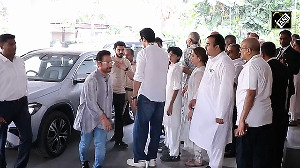 The American influential IT and telecom industry sought intervention of the Obama Administration against what they alleged are "discriminatory" Indian policies, which they claimed has resulted in several hundred millions of dollars of losses in the last quarter.
The American influential IT and telecom industry sought intervention of the Obama Administration against what they alleged are "discriminatory" Indian policies, which they claimed has resulted in several hundred millions of dollars of losses in the last quarter.
"In discussions with our member companies, we have quantified the potential Q4 losses at several hundred million dollars, with billions of dollars of lost exports and sales at risk in 2014 if these requirements remain in place.
"If left in place, these policies could shut out US technology companies from a critical emerging market," Information Technology Industry Council said in a letter to Obama Administration.
The letter dated September 24 against India's "compulsory registration order" which goes into effect on October 3, has been jointly written to the US Commerce Secretary, Penny S Pritzker; the US Trade Representatives, Mike Froman, and the Caroline Atkinson, the Deputy National Security Advisor to the US President for International Economic Affairs.
Under the new "Compulsory Registration Order" issued last year by the Department of Electronics and Information Technology, the ITIC alleged new equipment cannot be imported into or sold in India after April 3, 2013, which now has been extended to October 3, unless it is tested and registered with Bureau of Indian Standards-approved testing labs in India.
"We urgently request that you raise this issue with senior Indian officials during the Prime Minister’s visit to Washington. Specifically, we request US government support in pressing for at least a six-month delay in the implementation date beyond October 3, creation of an exemption for Highly-Specialised Equipment, and the suspension of fines for noncompliance given the backlog at BIS and the continuing, good-faith efforts by companies to meet the testing and registration requirements," said the ITIC letter.
The letter alleged that there is every reason to believe this policy is deliberately designed to disadvantage foreign companies in favour of domestic Indian ICT manufacturers, and to compel companies to help build and finance testing labs in India and force the transfer of technology through reverse engineering.
The letter has been signed by Gary Shapiro, president and CEO of Consumer Electronics Association; Dean C Garfield, president and CEO of Information Technology Industry Council and Grant Seiffert, president, Telecommunications Industry Association.
In their letter they said, US industry has raised concerns repeatedly for the past year with the Indian officials, including the Prime Minister's Office.
Senior public officials have admitted that India lacks the testing capacity to implement the rules and appear to understand the enormous costs and disruptions they are causing for companies.
"More specifically, senior US industry representatives in meetings with the Prime Minister’s Office in June of this year were provided unambiguous verbal assurances that the implementation deadline would be extended and that certain exemptions, including those for Highly Specialised Equipment, would be provided to ease pressure on companies," the letter said.
Meanwhile in a policy blog, Joshua Rosenberg of ITI said India's proposed registration plan is a market access barrier.
"While the Prime Minister put the forced localisation proposal in abeyance -- a decision that is good for both the Indian economy and economies around the world -- there's no word on when or whether the GoI (Government of India) will take forced localisation in the PMA context completely off the table. An official announcement to that effect would be a welcome announcement during the Prime Minister's visit," he wrote.
The industry, he said has urged the Indian government to delay the October 3 compulsory registration requirement, and to consider approaches that are consistent with international standards and practices.
"We also have urged leading US government officials to make a similar request to their Indian counterparts. Doing so is in the mutual interest of both governments and both economies," he wrote.
"We hope that, during his visit, the Prime Minister will gain a greater understanding of these concerns and work to develop approaches that drive progress for all sides, and don’t jeopardise his country’s current and future successes in the global economy," Rosenberg said.






 © 2025
© 2025